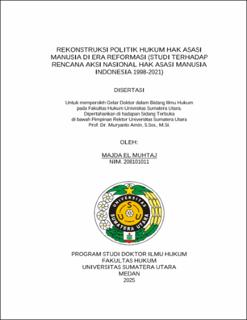| dc.contributor.advisor | Saidin | |
| dc.contributor.advisor | Suhaidi | |
| dc.contributor.advisor | Nasution, Mirza | |
| dc.contributor.author | Muhtaj, Majda El | |
| dc.date.accessioned | 2025-08-15T01:38:57Z | |
| dc.date.available | 2025-08-15T01:38:57Z | |
| dc.date.issued | 2025 | |
| dc.identifier.uri | https://repositori.usu.ac.id/handle/123456789/108135 | |
| dc.description.abstract | The Indonesian National Action Plan for Human Rights (Ranham) is a national
human rights commitment that is the basis of policy and guidelines for the government
[ministries/institutions/regional governments (K/L/Pemda) to implement human rights
programs and actions. Ranham is a national human rights policy document that is set for a
period of five years. Ranham has been running for more than two decades of government in
the Reformed era since 1998 until now. Ranham has implications for the conceptualization,
instrumentation and institutionalization of human rights in Indonesia. In its development,
Ranham has become an integral part of the national human rights commitment throughout the
period of government in the Reformed era.
This dissertation uses a type of normative legal research that is prescriptive analytical
in nature by prioritizing secondary data through library data, in the form of primary,
secondary and tertiary legal materials. This research data is also supported by primary data
obtained from field research through interviews with selected some informants. The research
approaches used is the statute approach, historical approach and conceptual approach. Data
analysis is qualitative and conclusions are drawn using the deductive reasoning method.
The results of the study indicate the need for Ranham regulations that are consistent
with Pancasila, the 1945 UUDNRI and laws and regulations related to human rights. Ranham
regulations still refer to regulations that do not strengthen the foundations of human rights
promotion and protection. Ranham regulations have not been able to adapt and modernize
Ranham institutions that are able to develop inclusive consultations with policy makers. The
results of the study show that Ranham has been able to run for two decades, but there was no
continuity of Ranham Indonesia policies, programs and activities that continued between one
period and another. An adaptive, modern and sustainable Ranham is very needed with the
conducting of human rights baseline study and the inclusive communication with
involvement of human rights stakeholders such as NHRIs, and civil society. | en_US |
| dc.language.iso | id | en_US |
| dc.publisher | Universitas Sumatera Utara | en_US |
| dc.subject | human rights | en_US |
| dc.subject | Ranham | en_US |
| dc.subject | national human rights system | en_US |
| dc.title | Rekonstruksi Politik Hukum Hak Asasi Manusia Di Era Reformasi (Studi Terhadap Rencana Aksi Nasional Hak Asasi Manusia Indonesia 1998-2021) | en_US |
| dc.title.alternative | The Reconstruction Of Politics Of Human Rights Law In Reformed Era (A Study Of The Indonesian National Human Rights Action Plans 1998-2021) | en_US |
| dc.type | Thesis | en_US |
| dc.identifier.nim | NIM208101011 | |
| dc.identifier.nidn | NIDN0013026203 | |
| dc.identifier.nidn | NIDN0013076207 | |
| dc.identifier.nidn | NIDN0026127203 | |
| dc.identifier.kodeprodi | KODEPRODI74001#Ilmu Hukum | |
| dc.description.pages | 443 Pages | en_US |
| dc.description.type | Disertasi Doktor | en_US |
| dc.subject.sdgs | SDGs 4. Quality Education | en_US |


